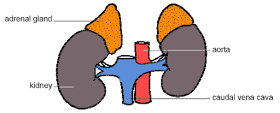Although adrenalectomies are only a first-line treatment for those with ACTH-independent tumors in Cushing's Syndrome (ectopic and adrenal tumors, benign and malignant), they are also often a treatment for those with Cushing's Disease when pituitary surgery fails to totally remove the source of excess ACTH.
Hypercortisolemia, the result of excess ACTH from the pituitary or from overproduction in ectopic or adrenal tumors, is very debilitating for those who suffer from CS/CD. According to the authors, "Untreated Cushing’s syndrome can cause significant physical and mental morbidity and mortality, with a mortality rate in untreated that is 4 times greater than the baseline population."
This study looked at the outcomes of 60 patients who underwent either a unilateral (53%) or bilateral adrenalectomy (47%) to treat their Cushing's. Except for one patient, all adrenalectomies were done laproscopically. The median follow-up time was 41.4 months. At that median time, 9 patients had died. 4 patients had died from the progression of malignant disease, 2 from unknown causes, 1 from pulmonary embolus 2 months after surgery, and 2 five months post-op from severe complications due to pituitary (ACTH-dependent) Cushing's Disease.
Around 75% of the common physical signs/symptoms of Cushing's resolved after surgery, but the central obesity only had a resolution rate of 57%. Diabetes was cured in 79%, hypertension "improved dramatically or was cured in 67%."
Symptoms took anywhere from a few weeks to 4 years to resolve with most of the physical changes resolving in a mean of 7-9 months. There was a great variability with no good predictor of this variability.
The remark that I find so telling is this:
In fact, we had several patients with ‘‘subclinical’’ Cushing’s who took over 2 years for their symptoms to resolve.Too often those of us who suffer with Cushing's are told to wait until the disease "gets worse" before being diagnosed/treated.
The authors point out the complication rates which are typically higher for Cushing's patients than for others who undergo adrenalectomies for whatever reason. Immunosuppression leads to greater risk of infection. Addisonian crisis is another prevalent complication. However, overall they conclude that adrenalectomies are a safe and effective treatment option, but both physicians and patients must not expect overnight improvements. This is another case of where slow and steady wins the race.
R SIPPEL, D ELARAJ, E KEBEBEW, S LINDSAY, J TYRRELL, Q DUH (2008). Waiting for change: Symptom resolution after adrenalectomy for Cushing's syndrome Surgery, 144 (6), 1054-1061 DOI: 10.1016/j.surg.2008.08.024


No comments:
Post a Comment